One hundred and eight Fellows from 48 different locations or organizations graduated from the Daniel K. Inouye Asia-Pacific Center for Security Studies’ Comprehensive Security Responses to Terrorism (CSRT) 19-1 course in Honolulu July 3.
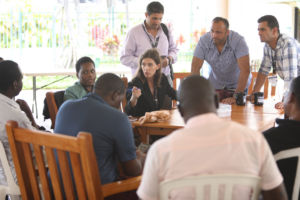
CSRT 19-1 Fellows take the discussion out to the DKI APCSS lanai where the change of venue seems to facilitate a more effective exchange of ideas.
Professor Shyam Tekwani was the course manager and Assoc. Prof. Elina Noor was the course coordinator.
Of the 108 participants, 72% were from military organizations and law enforcement agencies, with others representing various government ministries, foreign affairs departments and intelligence services and academic institutions. Just over half of the course participants were from the Indo-Pacific region, with five continents represented. A record high of 19% were female participants.
Fellows participating in CSRT 19-1 were from Argentina, Bangladesh, Bosnia, Botswana, Cambodia, Canada, Chad, Colombia, Egypt, Fiji, Georgia, Ghana, Guatemala, Honduras, Hong Kong, Indonesia, Iraq, Jordan, Kosovo, Laos, Lebanon, Malaysia, Maldives, Mexico, Micronesia, Mongolia, Morocco, Myanmar, Nepal, New Zealand, Nigeria, Oman, Papua-New Guinea, Paraguay, Philippines, Republic of Korea, Sierra Leone, Sri Lanka, Taiwan, Tanzania, Thailand, Trinidad and Tobago, Tunisia, Turkey, Uganda, United States, and Vietnam. One international organization, Interpol, was also represented.
Among the several innovations introduced in this iteration of the course was the daily news round-up, where Fellows were shown a selection of short media clips on a terrorist attack and invited to respond to the reportage. Fellows from the affected country or region, in particular, provided background information and context to the event followed by a robust question and answer session.
“As educators we face the daunting task of educating a new generation of counterterrorism professionals to move beyond traditional military thinking to not only react but take the initiative against dedicated, skillful, and creative adversaries,” explained Course Manager Prof. Shyam Tekwani. “Our emphasis was on terrorism as a multi-faceted issue that requires multi-disciplinary solutions beyond state-centric policies. In acknowledging that there is more to terrorism than recruitment strategies, tactics, techniques, doctrines and practices, the program focused on fostering a more self-reflective, critical approach to the study of terrorism by examining the effects of terrorism on human rights, law, policing, immigration, media, culture, identity, psychology, community relations, science, technology, and other aspects of life.”
However, Fellows seemed well equipped to face terrorism challenges as a result of the course.
“The number one thing I can take away from CSRT 19-1 is obtaining the perspectives from all the other Fellows that are here… and it’s not just regional or geographical, it’s global,” explained Levi Lynch, a U.S. Fellow. “I think any of these perspectives we can take from them, applies to things that I do every day in my job, and that’s important. One of the biggest things is alumni -being able to reflect on that, being able to reach back to some of those friends I made, and still keep in contact and ask for advice. Because even though I may have something going on here, it applies directly, or maybe they have experience in their area of the world and it’s all intertwined. If there’s one thing I’ve learned here is that something that’s happening in Africa might have the same building blocks or issues that are happening in the Philippines. Being a U.S. service member having deployed globally, that’s a huge positive thing I’ll take out of here.”
This CSRT course was divided into four modules. The first, “Approaches to Terrorism,” sought to critically unpack conventional thinking and approaches towards terrorism. Sessions outlined framing issues, bias, as well as commonly held assumptions related to terrorism.
The second module, “Understanding the Threat,” assessed the threat and trend lines of terrorism in the evolving security environment. Sessions holistically explored the drivers and trigger points of terrorism, considering among others who may be terrorists, why terrorism occurs, how the threat unfolds, as well as the means and methods used to further terrorism.
The third module, “Responses to Terrorism,” analyzed prevalent and dominant counter terrorism responses. Sessions evaluated their impact, consequences, as well as implications on terrorism-related developments in the near future.
The fourth and final module, “Comprehensive Strategies,” identified the principles of, and recommended measures for, a comprehensive security response.
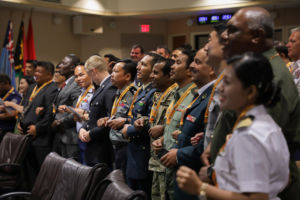
CSRT 19-1 Fellows lock arms and sing along with the traditional Hawaiian song “Aloha ‘Oe” a unique tradition at DKI APCSS conducted at the end of each long course.
Across the four modules, Fellows interacted in plenary and smaller seminar discussions. They also benefited from an array of singular and tracked electives where they could not only widen their understanding of counter-terrorism beyond plenary topics but also focus more deeply on themed areas of their choice. The menu of track and singular electives in this CSRT enabled many of the Fellows to fine-tune their individual projects for implementation back home.
“About the Fellow’s project, I think this is very important part of this course,” expressed Mustafa Toker, Senior Civil Inspector, Ministry of Internal Affairs, Turkey. “We are trying to learn from each other and benchmark from each other’s experiences, and create something unique for our countries.” If you try to hatch the egg from the inside, it turn out to be a bird. But, if you try to crack the egg from outside, it will do nothing. We had to create and something with our potential and our internal dynamics.”
During the course, Fellows watched terrorism-related documentaries from different regions. This simultaneously exposed them to the range of terrorist actors and motivations yet underscored the commonality of the challenge across the world. Additionally, a weekly debate was held where Fellows were able to exercise their public speaking skills in persuasion of motions that Fellows themselves determined at the start of the course.
“The course took an approach that was willing to challenge dominant knowledge and understandings of terrorism,” Tekwani continued. “To a large degree, the prevailing attitudes to terrorism bear the burden of its centrality in our lives. Perceptions are shaped and influenced by the way we educate and inform practitioners and lay people alike. And much of it is stems from the narrow and stove-piped approach that most of us, among scholars and educators, take in trying to understand the phenomenon”. It is against this backdrop that a much broader attempt to foster a more self-reflective, critical approach to the study and teaching of terrorism was essential – to put back the word ‘Comprehensive’ in the course and to bring in those aspects of ‘terrorism’, that cause discomfort within the prevailing paradigms of terrorism scholarship and education.”
DKI APCSS Director retired Rear Adm. Peter A. Gumataotao addressed the CSRT Fellows during the commencement ceremony on the final day.
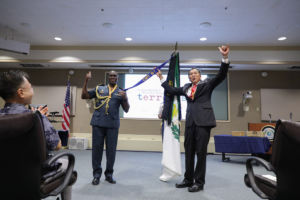
DKI APCSS Director Pete Gumataotao and senior Fellow Air Commodore Darryl Daniel of Trinidad and Tobago, present the CSRT 19-1 Course streamer.
“I want you to remember that you can and you will make a difference, you just have to try,” Gumataotao encouraged. “I hope you leave with a broader understanding of the complexity of the security environment – not just terrorism, which sometimes has second and third order effects that leads to the act of terrorism. It’s okay if you’re leaving here with more questions than answers. I challenge you though, to collaboratively seek those answers and make a positive contribution. I encourage you to foster these relationships after you leave.”
CSRT is an annual, special focus course that provides security practitioners from the Indo-Pacific region and around the world the operational and strategic-level skills necessary to enhance their ability to combat terrorism while cooperating with other regional partners. Through faculty lectures and guest speaker presentations in plenary sessions, real-world case studies, seminar discussions and collaborative experience and perspective sharing, Fellows explore the nature of current and future terrorist threats, examine the challenges associated with countering ideological support for terrorism and violent extremism, achieve a more common understanding of global and regional terrorism challenges, analyze tools and capabilities for combating terrorism and transnational threats in order to promote appropriate strategies. It is also designed to build relationships between and among the United States and current and future counterterrorism practitioners of participating countries, for the purpose to develop the trust and confidence necessary for increased information sharing while identifying ways to reduce obstacles to cooperation in the international struggle against those who use terror to promote their goals.
CSRT is one of five formal courses at DKI APCSS. The Center is a Department of Defense institution that addresses regional and global security issues. Military and civilian representatives, mostly from the Indo-Pacific nations, participate in a comprehensive program of executive education, professional exchanges and outreach events, both in Hawaii and throughout the Indo-Pacific region.
The Center supports U.S. Indo-Pacific Command by developing and sustaining relationships among security practitioners and national security establishments throughout the region. DKI APCSS’ mission is to build capacities and communities of interest by educating, connecting and empowering security practitioners to advance Indo-Pacific security. It is one of the Department of Defense’s five regional security studies centers.
Since opening in 1995, more than 12,542 alumni representing over 136 countries and territories have attended DKI APCSS courses and workshops.
-END-




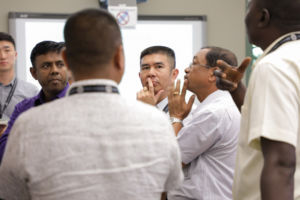

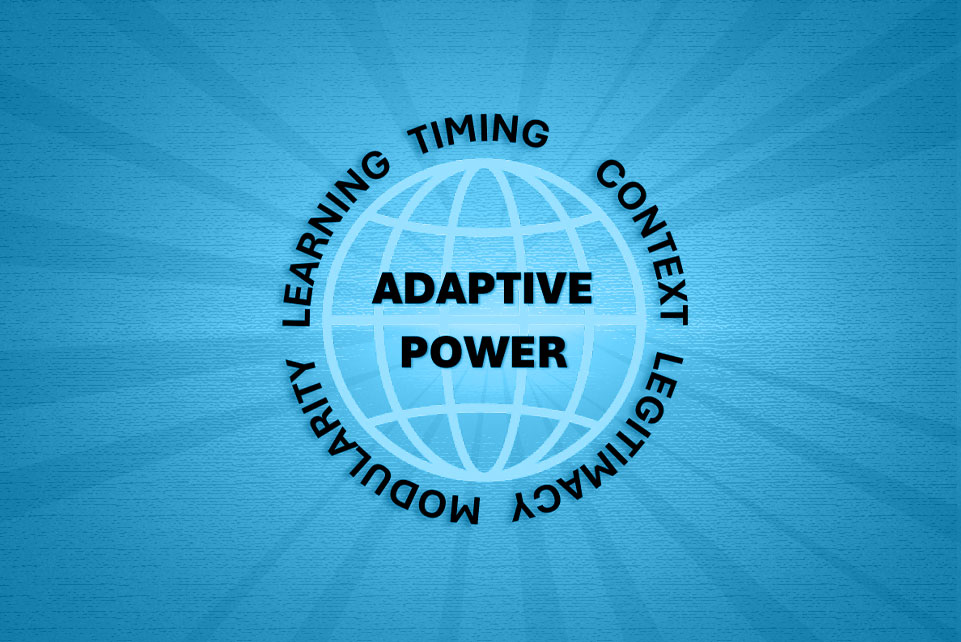
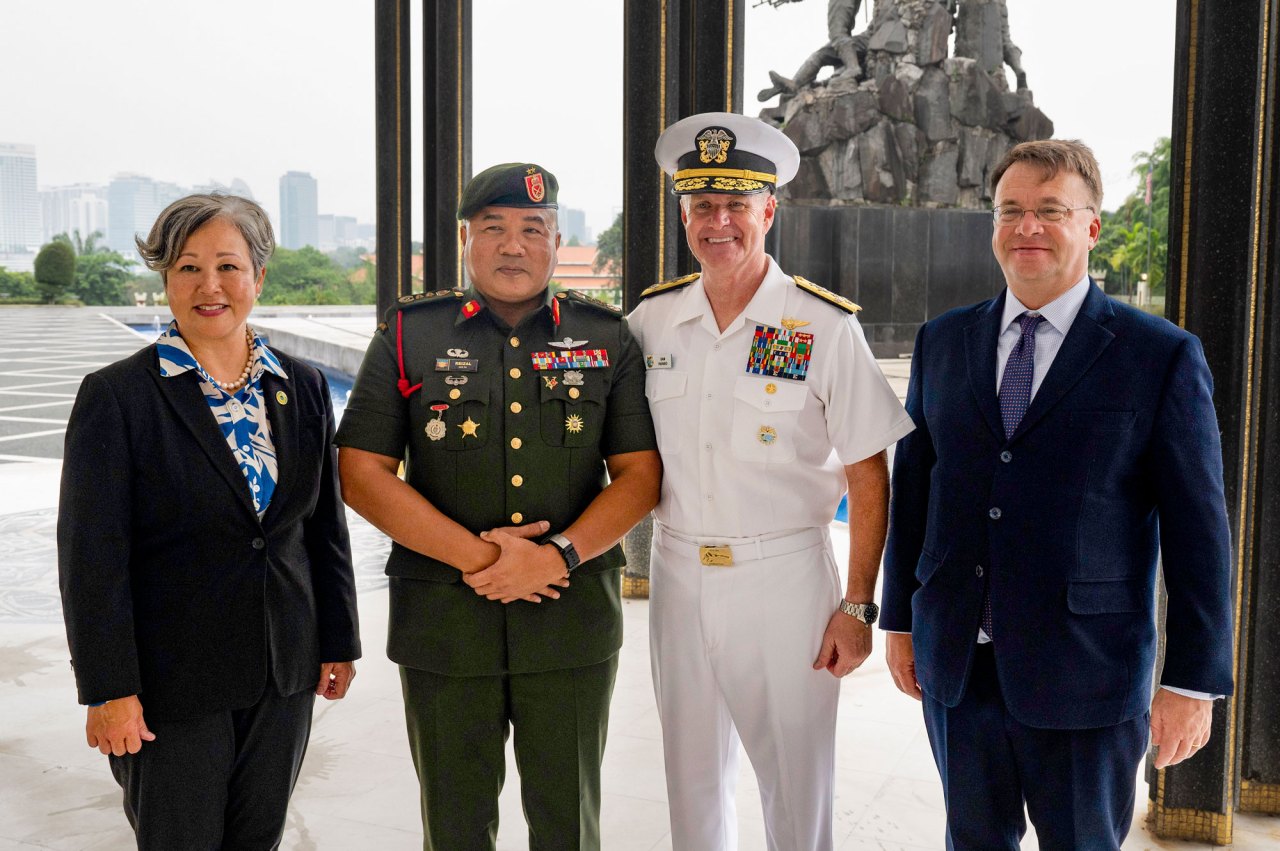




Course was conducted in a well organised way and fruitfull also. Recommended to be continued . The efforts on CT is really important and should realised by all concerned.